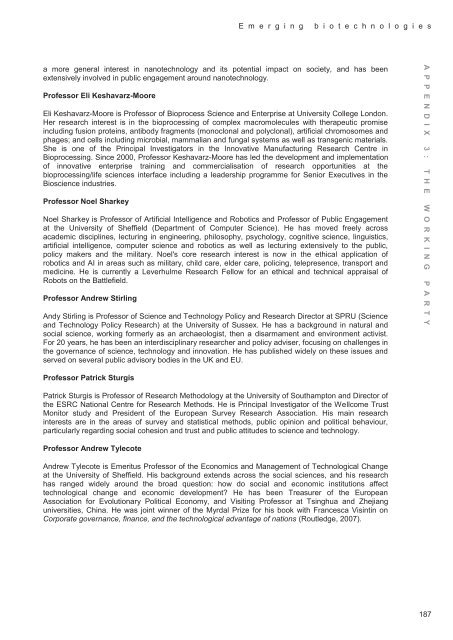Emerging biotechnologies: full report - Nuffield Council on Bioethics
Emerging biotechnologies: full report - Nuffield Council on Bioethics
Emerging biotechnologies: full report - Nuffield Council on Bioethics
You also want an ePaper? Increase the reach of your titles
YUMPU automatically turns print PDFs into web optimized ePapers that Google loves.
E m e r g i n g b i o t e c h n o l o g i e s<br />
a more general interest in nanotechnology and its potential impact <strong>on</strong> society, and has been<br />
extensively involved in public engagement around nanotechnology.<br />
Professor Eli Keshavarz-Moore<br />
Eli Keshavarz-Moore is Professor of Bioprocess Science and Enterprise at University College L<strong>on</strong>d<strong>on</strong>.<br />
Her research interest is in the bioprocessing of complex macromolecules with therapeutic promise<br />
including fusi<strong>on</strong> proteins, antibody fragments (m<strong>on</strong>ocl<strong>on</strong>al and polycl<strong>on</strong>al), artificial chromosomes and<br />
phages; and cells including microbial, mammalian and fungal systems as well as transgenic materials.<br />
She is <strong>on</strong>e of the Principal Investigators in the Innovative Manufacturing Research Centre in<br />
Bioprocessing. Since 2000, Professor Keshavarz-Moore has led the development and implementati<strong>on</strong><br />
of innovative enterprise training and commercialisati<strong>on</strong> of research opportunities at the<br />
bioprocessing/life sciences interface including a leadership programme for Senior Executives in the<br />
Bioscience industries.<br />
Professor Noel Sharkey<br />
Noel Sharkey is Professor of Artificial Intelligence and Robotics and Professor of Public Engagement<br />
at the University of Sheffield (Department of Computer Science). He has moved freely across<br />
academic disciplines, lecturing in engineering, philosophy, psychology, cognitive science, linguistics,<br />
artificial intelligence, computer science and robotics as well as lecturing extensively to the public,<br />
policy makers and the military. Noel's core research interest is now in the ethical applicati<strong>on</strong> of<br />
robotics and AI in areas such as military, child care, elder care, policing, telepresence, transport and<br />
medicine. He is currently a Leverhulme Research Fellow for an ethical and technical appraisal of<br />
Robots <strong>on</strong> the Battlefield.<br />
Professor Andrew Stirling<br />
Andy Stirling is Professor of Science and Technology Policy and Research Director at SPRU (Science<br />
and Technology Policy Research) at the University of Sussex. He has a background in natural and<br />
social science, working formerly as an archaeologist, then a disarmament and envir<strong>on</strong>ment activist.<br />
For 20 years, he has been an interdisciplinary researcher and policy adviser, focusing <strong>on</strong> challenges in<br />
the governance of science, technology and innovati<strong>on</strong>. He has published widely <strong>on</strong> these issues and<br />
served <strong>on</strong> several public advisory bodies in the UK and EU.<br />
A P P E N D I X 3 : T H E W O R K I N G P A R T Y<br />
Professor Patrick Sturgis<br />
Patrick Sturgis is Professor of Research Methodology at the University of Southampt<strong>on</strong> and Director of<br />
the ESRC Nati<strong>on</strong>al Centre for Research Methods. He is Principal Investigator of the Wellcome Trust<br />
M<strong>on</strong>itor study and President of the European Survey Research Associati<strong>on</strong>. His main research<br />
interests are in the areas of survey and statistical methods, public opini<strong>on</strong> and political behaviour,<br />
particularly regarding social cohesi<strong>on</strong> and trust and public attitudes to science and technology.<br />
Professor Andrew Tylecote<br />
Andrew Tylecote is Emeritus Professor of the Ec<strong>on</strong>omics and Management of Technological Change<br />
at the University of Sheffield. His background extends across the social sciences, and his research<br />
has ranged widely around the broad questi<strong>on</strong>: how do social and ec<strong>on</strong>omic instituti<strong>on</strong>s affect<br />
technological change and ec<strong>on</strong>omic development? He has been Treasurer of the European<br />
Associati<strong>on</strong> for Evoluti<strong>on</strong>ary Political Ec<strong>on</strong>omy, and Visiting Professor at Tsinghua and Zhejiang<br />
universities, China. He was joint winner of the Myrdal Prize for his book with Francesca Visintin <strong>on</strong><br />
Corporate governance, finance, and the technological advantage of nati<strong>on</strong>s (Routledge, 2007).<br />
187
















